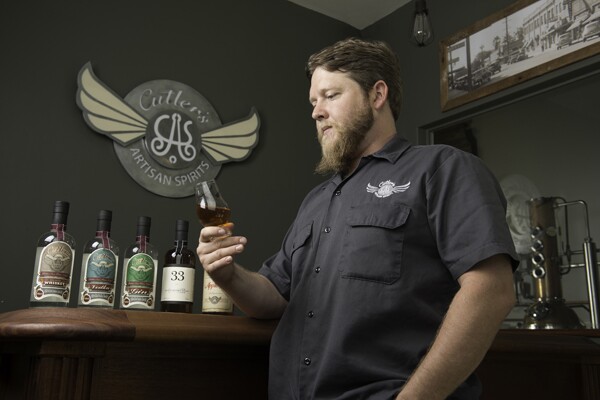Craft Distillers Push to Overturn Prohibition-Era Sales Laws

While Ian Cutler, the man behind Cutler's Artisan Spirits based in Santa Barbara's Funk Zone, started his business "to revive a long family history in the California spirits industry" -- his grandfather ran a moonshine operation in Oakdale -- he wishes history didn't hold such a strong grip on his current operation.
"The distilled spirits industry is still operating primarily under the laws established when Prohibition was repealed in 1933," Cutler says.
That means distillers can't sell their product directly to the public. It's part of the involved three-tier system of producer-distributor-retailer that somehow makes two of the three rich off the other.
If you've had the opportunity to visit a craft distiller (along with Cutler's there's Ascendant in Buellton, Greenbar in Los Angeles, Ballast Point in San Diego, to name just three of the 50 or so in California), you may have noticed it's not quite like visiting a wine tasting room. "Under current California law, Distilled Spirits Manufacturers such as Cutler's Distillery are allowed to offer a total of six tastings of our products, each no greater than a quarter ounce in volume," Cutler says. "Distilled Spirits Manufacturers are not allowed under any circumstances to sell spirits directly to customers, mix anything with samples of our spirits, or serve them in any way that could be considered a cocktail, like adding ice."
After much pressure and lobbying by the California Craft Distillers' Guild (CADG), Sacramento has perhaps seen the light. Recently a bill that looked doomed made it out of committee in an even better form, AB-1295. Not only would it permit distillers to sell three bottles per person per day directly, but it also, as Cutler says, "seeks to allow craft distilleries the ability to offer our samples in the form of a cocktail. This is important because it will allow distilleries to present our products in the form that the majority of people consume our products. The bill also seeks to allow craft distilleries the ability to operate a bona fide eating establishment including a retail bar on the premises of the distillery with proper licensing. This would be similar to the many brewpubs that currently operate throughout the state."
And how could restaurants pairing food with cocktails concocted with exquisitely distilled hooch be a bad thing?
In essence, AB-1295 creates a new type of distiller in California with the label of a Craft Distiller's License, which would allow for the production of up to 100,000 gallons per year. That might sound like enough bourbon and gin to leave L.A. County loopy (it's about 42,000 cases), but compared to the big boys of the distilling world, it's barely a drop in the ocean. In 2013, for instance, multinational Brown-Forman sold close to 11 million cases of Jack Daniel's -- only one of the whiskeys in their portfolio that includes Woodford Reserve, Old Forester, and Canadian Mist.
Cutler hopes AB-1295 can get full approval this fall, so people will be able to leave his tasting room with bottles of his tasty 33 Bourbon Whiskey or Grandma Tommie's Apple Pie liqueur (perfect for the chillier time of year). "After Prohibition ended, all California alcohol manufacturers, including wineries and breweries, were prohibited from selling direct to consumers," he explains. "The language prohibiting wineries and breweries from selling direct was eventually changed through lobbying efforts by the wine and beer industries, in the same way distilleries are now banding together to seek the same rights that wine and beer manufacturers enjoy."
Sounds like something we all could enjoy, if Sacramento does the right thing.